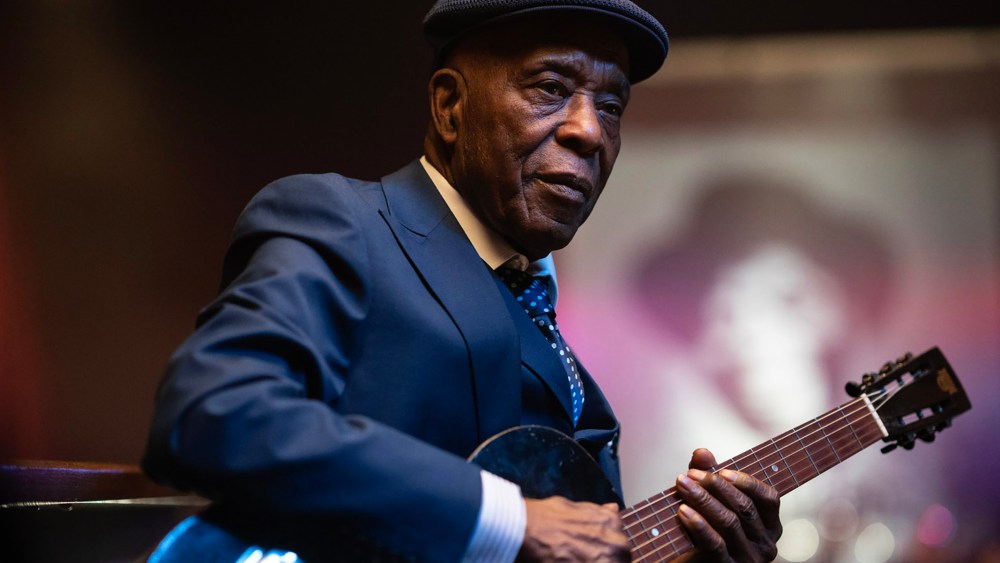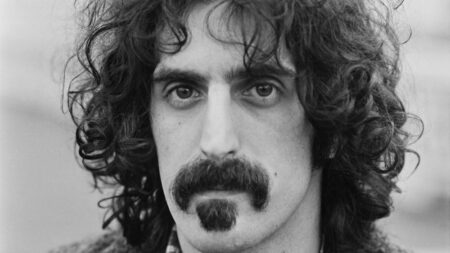Damn right, he’s got the blues… and the scars to show for it. A surprise extended cameo at the end of “Sinners” [spoiler alert!] reveals that Sammie, who is played as a youth in the 1930s by Miles Caton, survived the film’s long night of terror, thanks in part to how a resonator guitar can be used as a weapon. And he has lived on in the form of someone who looks and plays very much like Buddy Guy. It is Buddy Guy, of course, still around and still arguably — no, inarguably — the most legendary blues guitarist walking the planet.
Variety caught up with Guy, 88, on the phone from his native Chicago, where he still plays at his club, much like the aged Sammie in “Sinners” still plays at his. Guy says, “If I could get quite a few more people speaking like you, I might consider myself as a movie actor.” Then, he quickly adds, “No, that’s just a joke coming from me.”
But before we get with Buddy, a few words from the film’s composer and music producer, Ludwig Göransson, who worked with Guy on his performance and on the song the bluesman plays at the end of the film, “Travelin’.” A month before shooting, Göransson went out to Guy’s Chicago club and got to swap not just musical ideas but tales of old bluesmen like Son House, who was one of writer-director Ryan Coogler’s inspirations for the part. Then, in New Orleans, they filmed the al-important epilogue with Guy on the very first day of the shoot.
“He had a long day, on what was actually our production’s day zero,” says Göransson. “There’s quite a lot of dialogue he has, actually, and also, there were a lot of technical things that needed to happen with Michael (B. Jordan) and Hailee (Steinfeld) with her eyes and their vampire teeth. And I was just amazed by how Buddy Guy could withstand this 12-hour workday when he’s 88 years old. I was worried when we finished off with the song, because he has been doing dialogue and acting for eight, maybe 10 hours. But once we did the last scene where he is actually playing guitar, it was such a magical moment. We had a whole crew there on set, but it’s like you could hear a feather drop at the ground. It was very much of a goosebump moment.”
That last sequence has poignance for an audience, certainly, if you know who Buddy Guy is. If you don’t, it still intuitively translates, believes Göransson. “I was wondering, what are kids, our younger demographic, gonna think? But every time we screened the film, no one even asked, ‘Who’s that?’ It’s almost like, even if the people didn’t know who he was, there’s like an instant feeling that this is something else — like, you’re seeing a magician do a magic trick.”
Here’s our conversation with Guy, who will be out on the road this summer doing his “Damn Right Encore” tour, including an LA.-area date at the Cerritos Center on Aug. 10.
Did you have to sit in the makeup chair for quite a while get those scars applied?
Yeah, and I didn’t know they could do that. I was saying, “What the hell is this?” when they said, “We’re gonna make these scars on your face.”
Movies, man… As a kid, I loved the Westerns, because I grew up riding horses in Louisiana on the plantation, and seeing those old cowboys like Gene Autry, playing the acoustic guitar while riding a horse… I can’t imagine that’s me now. It’s a dream come true, to be honest with you.
This is a long way from a singing-cowboy movie. How did you feel about being in a horror film?
I saw a little something when they was shooting it. This guy (Michael B. Jordan) comes close to me, and I didn’t know he had these vampire teeth, and they got a close-up on him when he smiled. I said, “Oh my God!”
How were you approached to do this?
Well, they came into my club here in Chicago, and I was surprised. They say, “Look, we want you to play this little part that’s called Sammie.” And I’m saying, “Well, let me see”… Because I don’t have a high school education to be reading long scripts. I did learn how to read and write. I’m like BB King: I’m not fast at it, but if you give it to me and give me time, I can memorize it. But the older you get, the less you can memorize. Whatever can help the blues stay alive, I’m all for it, and I will try anything. I said, I don’t know if I’m good enough to do that. But I’ll give it a try, and if it works, it works, and if it doesn’t, at least I’ll say I gave it a try.
You know, I don’t know too much about movies. I made one a little bit with Tommy Lee Jones about 15 years ago (2009’s mystery-thriller “In the Electric Mist”). And when something like this comes along, I do it to help the blues.
It’s a mission, not just a profession, for you.
There’s very few radio stations other than satellite who play blues now. And the older people I learned from is no longer with us. But when I was coming up, on the AM stations everybody’s records were being played. There was gospel, jazz and the blues, and everybody knew who the late Lightnin’ Hopkins was. But nowadays, man, if you don’t tell ’em, they don’t know it. They’re like, “Who is that? Who’s Muddy Waters?” My grandkids don’t know nothing about the blues until they hit 21 and come up in the club while I’m there, and they say, “Granddad, I didn’t know you could do that!” So I’m 100% trying to support it so the next generation of white or Black kids can hear it and know more about the blues that was created way before the British type of (blues-rock) stuff come along and all the different types of music we have now. Muddy Waters and BB King, I knew ’em before they passed away, and they told me, “Man, if you outlive me, just try to keep the blues alive.”
So it just makes me feel good to see something that is letting people know a little more about it. So when they told me I had an interview with you, I said, “Yeah, I’ll take it.” Because anything we can do to help the blues stay alive, I’m for it. I’m in for it.
This movie seems like it is going to go a long way in furthering your mission of bringing the blues alive for new generations. And you certainly do your part in it well…
That’s the part I love to hear coming from somebody else… when somebody says, “I think it’s pretty good.”
I remember BB King talked about how he made a record with John Lee Hooker, and he said it took one take, and John Lee just jumped up out of the chair and said, “That’s it!” Well, I don’t say that, because I never know if I did a good job. Even when I play for a live audience now, sometimes I tell ’em, “I’m not the best in town, but I’m trying to be the best till the best come around.” But I watch your face. If you got a frown on your face — if whatever I play don’t move you — I say to myself, “I didn’t do a good job.” And sometimes I just do little tricky things and I see a smile, and I think, “I must’ve hit the right note.”
You have a humility about what you do, which is surprising, after you’ve been a guitar hero for so many decades.
I still know a lot of guitar players, man, that is better than me. I’m just being honest with you. Because sometimes I see young people come up now playing a lick, and I’m saying, “I’ve had this guitar in my hands for 70 years. How come I couldn’t find that lick that this young kid, like Kingfish or Johnny Lang, did?” I got it from the people that invented it, from Son House, Fred McDonald, and all those people played that music for the love of music. They wasn’t making a decent living. Some of ’em had day jobs, including me. In 1967, I was driving a tow truck and playing the music here in Chicago at night.
You perform a lot at your club in Chicago, but you wrapped up your farewell tour last year, right?
No, no, no. They put that in: “farewell tour.” I’m having kind of a delayed farewell tour; maybe after this year I might say that. But I’m still playing some of the big festivals. Bobby Rush, Willie Nelson and me, they call us the last of the 89- and 90-year-olds that’s still out there, and that’s kind of kept me to say, “Buddy, you better go back out there and play a little more, because there ain’t nobody left after you of that age that’s still standing around.” Because BB King was in a wheelchair for maybe four or five years before he died, and I’m not on crutches yet. So I want to at least go another year.
We hope to see you when you’re out on the road.
Well, if I’m coming there, I always invite people like you in my dressing room. And I always have a shot of cognac, because I’m still nervous. That’s the only time I take a drink: when I gotta go on the stage. I got whiskey at my house, but you couldn’t find my fingerprints on the bottle, because it never crossed my mind (to take a drink) until I gotta go to the stage. I’m like, I know I can’t please nobody, but lemme get a little shot of cognac so I can hope it’ll make me feel like you’ve given the best that you have.
But with or without that, you have to be confident you can still deliver for an audience.
Age takes effect on your voice, your walk, whatever you do as you get up into your 80s. And damn, I’m near 90 years old, man. You can’t do what you did when you was 25 or 26. But I’m gonna give you the best I got, and that’s all I got.
Are you able to accept that you’re a movie star right now?
I don’t make that kind of comment, that I’m a movie star… but every time I hear something coming from people like you, it makes the goose pimples come up on me.
Read the full article here








